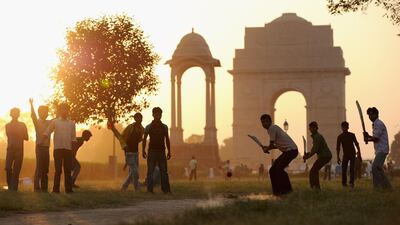The single most divisive factor in India is the caste system, but a new study suggests that the fault lines of caste may be repaired somewhat by the single most unifying factor in India: cricket.
The study led by Matt Lowe, an economics researcher at the Massachusetts Institute of Technology (MIT), found that young men make friends from other castes and show less discrimination after playing cricket alongside them.
Mr Lowe, along with researchers from MIT’s Abdul Latif Jameel Poverty Action Lab, organised a series of month-long cricket tournaments from January to July this year in Uttar Pradesh, a state with particularly rigid caste hierarchies.
Roughly 98 per cent of married women in Uttar Pradesh share the same caste as their husband. Villages are still segregated into neighbourhoods by caste.
Around 27 per cent of Uttar Pradesh’s scheduled castes — the legal term for Hinduism’s lowest castes — reported being treated as untouchable over the previous five years, according to a study in 2014. Other academic studies have found that 37 per cent of members of higher castes practise untouchability — avoiding interaction and physical contact with the lowest castes.
But cricket cuts across these barriers, Mr Lowe's team found.
“Features of cricket make [collaborative] contact … natural: teams have to be formed, players must collaborate together to win, and teams must face opponents,” Mr Lowe wrote. The common purpose, he theorised, would help shift attitudes.
Mr Lowe divided the participants in his study — 1,261 males aged between 14 and 30 — into randomly allocated five-man teams. Each team played in one of eight month-long tournaments organised for the study. Some teams featured players of different castes; others were comprised of players from a single caste.
As they played, Mr Lowe tracked how the players interacted and how frequently they appeared to show caste favouritism. He found that, on average, players ended the tournament with 1.2 more friends from other castes if their teammates were all from other castes.
When players were asked to elect a team member to receive professional coaching, the study found that “collaborative contact reduced own-caste favouritism in voting by up to 33 per cent”. In other words, if a cricketer had been in a team of mixed caste, he was 33 per cent less likely to display favouritism by voting for a player from his own caste.
But caste considerations did not melt away altogether, the study found.
In choosing captains, in deciding the order in which players bat, and in picking who gets to bowl, upper castes enjoyed clear favouritism. Even when teams were informed in advance about the quality and skill levels of their players, upper castes tended to discriminate against more able team members from lower castes.
Questions about caste and its intersection with cricket appear even at the highest level of the sport in India.
While Indian national teams over the decades have featured players of different religions, the representation of Hinduism's lower castes has been meagre. Of the 289 players who have represented India in Test cricket — the five-day international version of the game — only three might be of the Dalit caste, Hinduism's lowest, said Suresh Menon, who edits the Wisden India Almanack, an annual compilation of statistics and articles on the sport.
It is not easy be certain because cricketers' castes are not made public and Dalit origins cannot always be inferred from names.
On the other hand, dozens of Brahmins from the top of the caste system — whose names do often reflect their caste — have represented the country in the game.
Mr Menon found the lack of lower-caste representation in the Test teams “a reflection of the national situation in other fields too”.
Perhaps people from lower castes "don't see cricket as a career”, he said, or “used to discrimination in other fields, they expect that in cricket too”.
The sport is more egalitarian today than in decades past, he noted. Opportunities and infrastructure have expanded, and it is not only the wealthy or the middle class who make it into the national team. In the current team, one player is the son of a coal miner, another is the son of a water-pump operator, and a third is the son of a security guard.
Mr Menon said “the problem might be at the lower levels — schools and clubs — where a Brahmin father tends to have more money and clout and could thus influence” the selection of his son in a team.
Cricket is an expensive game, and a young player requires the right equipment and coaching lessons to prosper. These restrictions on access have to do more with wealth and class than caste, Mr Menon said. But given how neatly caste still overlaps with class — the lowest castes are among India’s poorest — a financial factor is also a caste factor.
But since all sport is focused on winning, cricket leans towards meritocracy, even if it has yet to achieve it at every level of the game, Mr Menon said. “The best team must play, it is generally agreed, since cricket is too important for compromises to be forced upon it.”

